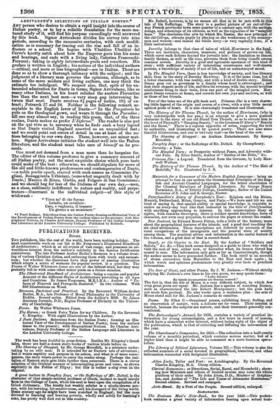AltRITABENB'S 'SELECTIONS OF ITALIAN POZTRY..
Aar person who desires to obtain a rapid insight into the course of Italian poetry, or to lay a reliable foundation for the more ma- tared study of it, will find his purpose exceedingly well answered by this book. Signor Arrivabene divides his survey into nine periods, according to the successive centuries, with such modifi- cation as is necessary for tracing out the rise and fall of an in- fluence or a school. He begins with Tirbaldino trbaldini del Cervo's knotty catch about how the Emperor gave him his name and bearings, and ends with a living lady, Caterina Franceschi- Ferrucci ; taking in eighty intermediate poets and versifiers. His preface is written in English ; his notices of the individual authors —critical, and more or less biographical—are in Italian. These are done so as to show a thorough intimacy with the subject ; and the judgment of a literary man governs the opinions, although, as to some of the more modern and living authors, one may think the estimate too indulgent. We suspect also, that, spite of his un- bounded admiration for Dante in terms, Signor Arrivabene, like so many other Italians, in his heart relishes the austere Florentine less than the next best men—a very steep gap intervening be- tween that next. Dante receives 51 pages of notice, 101 of ex- tract; Petrarch 27 and 24. Neither is the following remark ac- ceptable to the English lover of Dante—" In the Purgatorio he puts on the theological gown, and wears it through the Paradiso ; till one may almost say, in reading this poem, that, of the three realms, Dante makes us prefer L'Inferno." The reader is also put on the qui vivo as to accuracy when he finds such a hazy legend as that Dante visited England asserted as an unqualified fact; and we could point out errors of detail in one at least of the no- tices belonging to our own days. These, however, are minor mat- ters. Signor Arrivabene initiates the student well into the Italian literature, and the student must take care of himself as he pro- ceeds.
One must not demand from a man more than he bargains for. The editor of this volume professes to give a summary account of all Italian poetry, not the most exquisite choice which pure taste could make of the best : otherwise, we should stipulate for more of the old and little-known predecessors and contemporaries of Dante, —a noble poetic epoch, starred with such names as Giacomino Pu- gliesi, Bonaggiunta Urbiciani, (somewhat ungently dealt with by Dante,) Mazzeo di Rim), Giotto, and Folgore di San Geminiano ; and we should beg for less of the Italians of our own day,—men, as a class, sublimely indifferent to nature and reality, and perpe- trators—Guerrazzi is the individual culprit—of this style of wishwash : " Vivea ne' di the furono
Lutalto, un cavalier° : Caso, o vaghezza, ii trassero
un giomo a en monistero."
Poeti Italiani. Selections from the Italian Poets; forming an Historical View of the Development of Italian Poetry from the earliest times to the present; with Bio- graphical Notices, by Charles Arrivabene, Deputy Professor of the Italian Language and Literature in the London University College. Published by Rolandi.


























 Previous page
Previous page